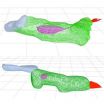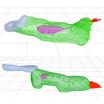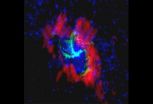(Press-News.org) The dirt in your backyard may hold the key to isolating cancerous tumors and to potential new treatments for a host of cancers.
University of Iowa researchers have found a gene in a soil-dwelling amoeba that functions similarly to the main tumor-fighting gene found in humans, called PTEN.
When healthy, PTEN suppresses tumor growth in humans. But the gene is prone to mutate, allowing cancerous cells to multiply and form tumors. PTEN mutations are believed to be involved in 40 percent of breast cancer cases, up to 70 percent of prostate cancer cases, and nearly half of all leukemia cases, according to a review of the literature by the UI researchers. Combined, more than 465,000 new cases of breast and prostate cancer have been documented in 2014, according to data from the American Cancer Society.
"If you look at tumors across the board—and that doesn't mean just breast cancer or prostate cancer—you find that PTEN is the most generally mutated gene. And when you mutate PTEN in mice, you cause tumors," says David Soll, biology professor and corresponding author on the study, published in the journal PLOS ONE.
While it's unknown how to prevent PTEN mutations, the UI researchers became interested in finding out whether other human genes may substitute for PTEN, like a player coming off the bench when the star has been injured.
After some searching, the team found that an amoeba, Dictyostelium discoideum, has the gene ptenA, which mutates similarly to the human PTEN gene and causes behavioral defects in the cell. They also found a close relative of ptenA in the amoeba, which they called lpten that performs the same functions of ptenA, but to a lesser degree—a possible bench player in the amoeba's genome.
The researchers hypothesized that ramping up the presence of lpten, making it the star on the court, could overcompensate for the mutated ptenA.
Soll and his team tested their hypothesis by placing lpten in a plasmid behind a powerful promoter designed to over-express the gene – essentially cranking up its power. They then introduced the super-charged lpten into a cell with the mutated ptenA gene. The researchers found that the over-expressed lpten gene fully overcompensated for all of the defects in the ptenA mutant.
If the hypothesis holds true for human cells, it could lead to a new way to treat cancer. The researchers want to look for a drug that would activate the promoter for one of PTEN's close relative genes. Once a patient is diagnosed with cancer caused by a PTEN mutation, the patient could take the drug, over-express the PTEN bench player gene, and potentially stop cancer in its tracks, Soll says.
That could save many cancer patients from undergoing chemotherapy and radiation treatment for breast and other common cancers.
The finding has led the UI team to study other human genes that may be able to step in for the mutated PTEN gene and perform the same tumor-suppressing role. There are at least two close relatives of PTEN the researchers are currently studying.
"And nature might have put them there just for that, that's the curious thing," Soll explains. "Somewhere, there may be a backup system, what we call 'redundancy,' that might be the basis for better identifying tumors and possibly creating cancer-fighting drugs. You have another gene which might be able to step in for the broken gene to keep things normal, and that's what we're playing with here. It's very sophisticated."
INFORMATION:Daniel Lusche of the University of Iowa is the first author on the paper. Contributing authors on the study include Deborah Wessels, Nicole Richardson, Kanoe Russell, Brett Hanson, Benjamin Soll, and Benjamin Lin, all working in the Monoclonal Antibody Research Institute in the Biology Department at Iowa.
The Developmental Studies Hybridoma Bank, a national resource created by the National Institutes of Health and housed at the University of Iowa, supported the study.
Treating cancer: UI biologists find gene that could stop tumors in their tracks
2014-10-14
ELSE PRESS RELEASES FROM THIS DATE:
How metastases develop in the liver
2014-10-14
This news release is available in German. In order to invade healthy tissue, tumor cells must leave the actual tumor and enter the bloodstream or lymphatic system. For this purpose, they use certain enzymes, proteases that break down the tissue surrounding the tumor, thus opening the way for tumor cells to reach blood or lymphatic vessels. To keep the proteases in check, the body produces inhibitors such as the protein TIMP-1, which thwart the proteases in their work.
But during development of metastases, the control function of this inhibitor appears not only to ...
Size of minority population impacts states' prison rates, Baker Institute researcher finds
2014-10-14
HOUSTON – (Oct. 13, 2014) – New research from Rice University's Baker Institute for Public Policy found that states with a large minority population tend to incarcerate more people.
According to lead author Katharine Neill, states with large African-American populations are more likely to have harsher incarceration practices, worse conditions of confinement and tougher policies toward juveniles compared with other states. She said these findings provide some support for long-standing arguments among sociology and criminal justice experts that the criminal ...
Uncertain reward more motivating than sure thing, study finds
2014-10-14
Recently, uncertainty has been getting a bad rap. Hundreds of articles have been printed over the last few years about how uncertainty brings negative effects to the markets and creates a drag on the economy at large. But a new study appearing in the February 2015 edition of the Journal of Consumer Research finds that uncertainty can be motivating.
In "The Motivating-Uncertainty Effect: Uncertainty Increases Resource Investment in the Process of Reward Pursuit," Professors Ayelet Fishbach and Christopher K. Hsee of the University of Chicago Booth School of Business and ...
Inside the Milky Way
2014-10-14
Is matter falling into the massive black hole at the center of the Milky Way or being ejected from it? No one knows for sure, but a UC Santa Barbara astrophysicist is searching for an answer.
Carl Gwinn, a professor in UCSB's Department of Physics, and colleagues have analyzed images collected by the Russian spacecraft RadioAstron. Their findings appear in the current issue of The Astrophysical Journal Letters.
RadioAstron was launched into orbit from Baikonur, Kazakhstan, in July 2011 with several missions, one of which was to investigate the scattering of pulsars ...
PTPRZ-MET fusion protein: A new target for personalized brain cancer treatment
2014-10-14
Researchers at the University of California, San Diego School of Medicine have identified a new fusion protein found in approximately 15 percent of secondary glioblastomas or brain tumors. The finding offers new insights into the cause of this cancer and provides a therapeutic target for personalized oncologic care. The findings were published this month in the online edition of Genome Research.
Glioblastoma is the most common and deadliest form of brain cancer. The majority of these tumors – known as primary glioblastomas – occur in the elderly without evidence ...
Researchers say academia can learn from Hollywood
2014-10-14
HOUSTON, Oct. 13, 2014 – According to a pair of University of Houston (UH) professors and their Italian colleague, while science is increasingly moving in the direction of teamwork and interdisciplinary research, changes need to be made in academia to allow for a more collaborative model to flourish.
Professors Ioannis T. Pavlidis and Ioanna Semendeferi from UH and Alexander M. Petersen from the IMT Lucca Institute for Advanced Studies in Italy published a commentary in the October 2014 issue of Nature Physics, articulating policies that will harmonize academic ...
University of Tennessee study finds crocodiles are sophisticated hunters
2014-10-14
Recent studies have found that crocodiles and their relatives are highly intelligent animals capable of sophisticated behavior such as advanced parental care, complex communication and use of tools for hunting.
New University of Tennessee, Knoxville, research published in the journal Ethology Ecology and Evolution shows just how sophisticated their hunting techniques can be.
Vladimir Dinets, a research assistant professor in UT's Department of Psychology, has found that crocodiles work as a team to hunt their prey. His research tapped into the power of social media ...
Out-of-step cells spur muscle fibrosis in Duchenne muscular dystrophy patients
2014-10-14
AUDIO:
A study in The Journal of Cell Biology suggests that asynchronous regeneration of cells within muscle tissue leads to the development of fibrosis in patients with Duchenne muscular dystrophy. Listen...
Click here for more information.
Like a marching band falling out of step, muscle cells fail to perform in unison in patients with Duchenne muscular dystrophy. A new study in The Journal of Cell Biology reveals how this breakdown leads to the proliferation of stiff fibrotic ...
University of Calgary research leads to brain cancer clinical trial
2014-10-14
Researchers at the University of Calgary's Hotchkiss Brain Institute (HBI) and Southern Alberta Cancer Research Institute (SACRI) have made a discovery that could prolong the life of people living with glioblastoma – the most aggressive type of brain cancer. Samuel Weiss, PhD, Professor and Director of the HBI, and Research Assistant Professor Artee Luchman, PhD, and colleagues, published their work today in Clinical Cancer Research, which is leading researchers to start a human phase I/II clinical trial as early as Spring 2015.
Researchers used tumour cells derived ...
Thyroid carcinoma: Biomarker reveals cancer cause
2014-10-14
CLIP2 serves as a radiation marker: After exposure to radiation from radioiodine, both the genetic activity and the protein expression are increased, as the scientists' studies were able to substantiate.
CLIP2 appears to be particularly significant in the development of tumours in the thyroid gland after radiation exposure. The team around Martin Selmansberger, Dr. Julia Heß, Dr. Kristian Unger and Prof. Dr. Horst Zitzelsberger from the Radiation Cytogenetics Research Unit at the Helmholtz Zentrum München discovered a connection between high CLIP2 levels and ...




